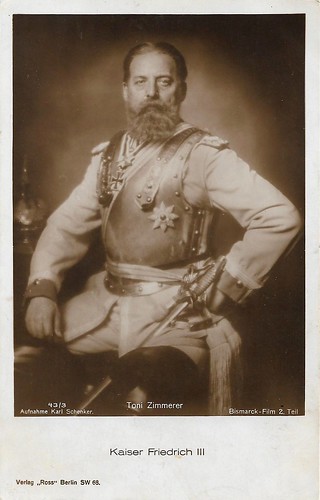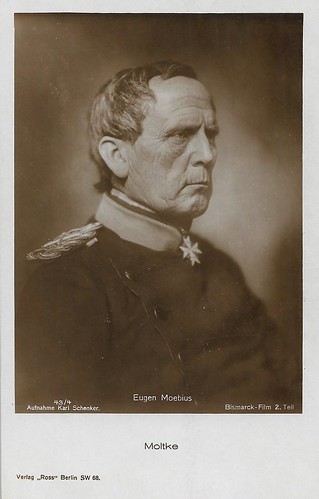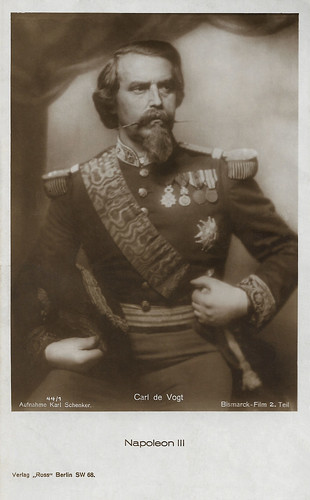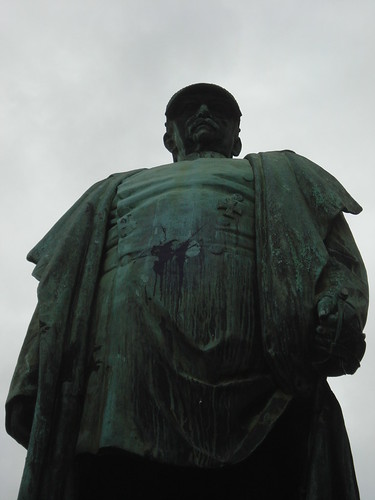One of the most prominet Prussian films was the Bismarck-Film project on Otto von Bismarck, prime minister of Prussia (1862–73, 1873–90) and founder and first chancellor (1871–90) of the German Empire. Yesterday we posted on Bismarck, Teil. 1 (Ernst Wendt, 1925), which deals with the period from 1815 to 1862. Today a post on the second part, Bismarck 1862-1898/Bismarck-Film, 2. Teil (Kurt Blachnitzky, 1926), about Bismarck's late, decisive years as Prussian Prime Minister and German Chancellor. Franz Ludwig starred again as Otto von Bismarck, and for this film Karl Schenker made a wonderful portrait series which were published as postcards by Ross Verlag.

German postcard by Ross Verlag, no. 43/2. Photo: Karl Schenker / Bismarck-Film. Postcard for the German biopic Bismarck 1862-1898 aka Bismark. 2. Teil (Kurt Blachnitzky, 1926) with Adolf Klein as Emperor Wilhelm I, the King of Prussia who on Bismarck's instigation was crowned Emperor of Germany in 1871 in Versailles, at the Galerie des Glaces.

German postcard by Ross-Verlag, Berlin, no. 43/3. Photo: Karl Schenker / Bismarck-Film. Publicity still for Bismarck 1862-1898/Bismarck-Film, 2. Tei (Kurt Blachnitzky, 1927) with Toni Zimmerer as German Emperor Friedrich III, who only ruled for 99 days. Frederick, Crown Prince since 1861 when his father became King of Prussia, fought in the wars against Denmark, Austria, and France, even if he hated war, showed mercy to his enemies, and attended to German victims. When Wilhelm became Emperor of Germany in 1871, Frederick also became Crown Prince to the Empire. As he and his wife Victoria, daughter of Queen Victoria, were on the liberal side, e.g. defending the Jewish German population against antisemitic attacks, they often clashed with Wilhelm and Bismarck, and the latter two tried to curtail Frederick's power as much as possible. Frederick's own son, Wilhelm II, hated his father's liberal ideas and allied with his grandfather, though he dismissed Bismarck as soon as he became Emperor himself. Historians dispute whether history, in particular, German history, would have taken another turn, had Frederick lived longer. In 1887 he was diagnosed with laryngeal cancer, which increasingly wrecked him, despite various attempts to remove the cancer. He became emperor when his father died in 1888, but was rather powerless. On 15 June 1888 he died.
Bismarck 1862-1898 is a 1926 German silent historical film directed by Kurt Blachnitzky, later known as Kurt Blachy. Because it was a sequel to Bismarck, Teil. 1 (Ernst Wendt, 1925), Bismarck 1862-1898 is sometimes referred to as Bismarck Part II. Franz Ludwig starred again as Otto von Bismarck, and also Robert Leffler and Erna Morena returned. The film's sets were designed by the art director Willi Herrmann.
Bismarck 1862-1898 depicts the latter part of Otto von Bismarck's career including his long spell as Chancellor of Germany. In 1862, King Wilhelm I appointed Bismarck as Minister President of Prussia, a position he would hold until 1890, with the exception of a short break in 1873. He provoked three short, decisive wars against Denmark, Austria, and France. Following the victory against Austria, he abolished the supranational German Confederation and instead formed the North German Confederation as the first German national state in 1867, leading it as Federal Chancellor. This aligned the smaller North German states behind Prussia. Later receiving the support of the independent South German states in the Confederation's defeat of France, he formed the German Empire in 1871, unifying Germany with himself as Imperial Chancellor, while retaining control of Prussia at the same time. The new German nation excluded Austria, which had been Prussia's main opponent for predominance among the German states.
With that accomplished by 1871, Bismarck skillfully used balance of power diplomacy to maintain Germany's position in a Europe which, despite many disputes and war scares, remained at peace. Bismarck's diplomacy of realpolitik and powerful rule at home gained him the nickname the 'Iron Chancellor'. German unification and its rapid economic growth was the foundation to his foreign policy. He disliked colonialism but reluctantly built an overseas empire when it was demanded by both elite and mass opinion. Juggling a very complex interlocking series of conferences, negotiations and alliances, he used his diplomatic skills to maintain Germany's position and used the balance of power to keep Europe at peace in the 1870s and 1880s. Bismarck distrusted democracy and ruled through a strong, well-trained bureaucracy with power in the hands of a traditional Junker elite that consisted of the landed nobility in eastern Prussia. Under Wilhelm I, Bismarck largely controlled domestic and foreign affairs, until he was removed by the young Kaiser Wilhelm II in 1890, at the age of seventy-five.
Although Bismarck 1862-1898 was in fact propaganda propagated by German-national circles, the film was poorly received by the political right who accused it of "reducing a genius to the level of banality". The film also received extremely bad reviews in the newspapers and was rejected by the public. The following year, producer Josef Coböken tried it with another Prussian film, Luther – Ein Film der deutschen Reformation/Luther (Hans Kyser, 1927) about the life of Martin Luther, father of the Protestant Reformation. Again, it was not a success, and Coböken left the film business.

German postcard by Ross Verlag, no. 43/4. Photo: Karl Schenker / Bismarck-Film. Postcard for the German biopic Bismarck 1862-1898 aka Bismark. 2. Teil (Curt von Blachnitzky, 1926) with Eugen Moebius as Helmuth Karl Bernhard von Moltke, head of the Prussian army from 1857, and thus victoriously leading the Prussians during the wars against Denmark (1864), Austria and its German allies (1866), and France (1870-1871).

German postcard by Ross-Verlag, Berlin, no. 44/1. Photo: Karl Schenker / Bismarck-Film. Publicity still for Bismarck 1862-1898/Bismarck-Film, 2. Tei (Kurt Blachnitzky, 1927) with Carl de Vogt as Napoleon III.

Statue of Otto von Bismarck. The statue is part of a Bismarck memorial at the Geschwister Scholl-Platz, Barmen, Wuppertal, Germany. Statue by Hugo Lederer.
Sources: Kenneth Barkin (Encyclopaedia Britannica), Wikipedia (German and English), and IMDb.

German postcard by Ross Verlag, no. 43/2. Photo: Karl Schenker / Bismarck-Film. Postcard for the German biopic Bismarck 1862-1898 aka Bismark. 2. Teil (Kurt Blachnitzky, 1926) with Adolf Klein as Emperor Wilhelm I, the King of Prussia who on Bismarck's instigation was crowned Emperor of Germany in 1871 in Versailles, at the Galerie des Glaces.

German postcard by Ross-Verlag, Berlin, no. 43/3. Photo: Karl Schenker / Bismarck-Film. Publicity still for Bismarck 1862-1898/Bismarck-Film, 2. Tei (Kurt Blachnitzky, 1927) with Toni Zimmerer as German Emperor Friedrich III, who only ruled for 99 days. Frederick, Crown Prince since 1861 when his father became King of Prussia, fought in the wars against Denmark, Austria, and France, even if he hated war, showed mercy to his enemies, and attended to German victims. When Wilhelm became Emperor of Germany in 1871, Frederick also became Crown Prince to the Empire. As he and his wife Victoria, daughter of Queen Victoria, were on the liberal side, e.g. defending the Jewish German population against antisemitic attacks, they often clashed with Wilhelm and Bismarck, and the latter two tried to curtail Frederick's power as much as possible. Frederick's own son, Wilhelm II, hated his father's liberal ideas and allied with his grandfather, though he dismissed Bismarck as soon as he became Emperor himself. Historians dispute whether history, in particular, German history, would have taken another turn, had Frederick lived longer. In 1887 he was diagnosed with laryngeal cancer, which increasingly wrecked him, despite various attempts to remove the cancer. He became emperor when his father died in 1888, but was rather powerless. On 15 June 1888 he died.
The Iron Chancellor
Bismarck 1862-1898 is a 1926 German silent historical film directed by Kurt Blachnitzky, later known as Kurt Blachy. Because it was a sequel to Bismarck, Teil. 1 (Ernst Wendt, 1925), Bismarck 1862-1898 is sometimes referred to as Bismarck Part II. Franz Ludwig starred again as Otto von Bismarck, and also Robert Leffler and Erna Morena returned. The film's sets were designed by the art director Willi Herrmann.
Bismarck 1862-1898 depicts the latter part of Otto von Bismarck's career including his long spell as Chancellor of Germany. In 1862, King Wilhelm I appointed Bismarck as Minister President of Prussia, a position he would hold until 1890, with the exception of a short break in 1873. He provoked three short, decisive wars against Denmark, Austria, and France. Following the victory against Austria, he abolished the supranational German Confederation and instead formed the North German Confederation as the first German national state in 1867, leading it as Federal Chancellor. This aligned the smaller North German states behind Prussia. Later receiving the support of the independent South German states in the Confederation's defeat of France, he formed the German Empire in 1871, unifying Germany with himself as Imperial Chancellor, while retaining control of Prussia at the same time. The new German nation excluded Austria, which had been Prussia's main opponent for predominance among the German states.
With that accomplished by 1871, Bismarck skillfully used balance of power diplomacy to maintain Germany's position in a Europe which, despite many disputes and war scares, remained at peace. Bismarck's diplomacy of realpolitik and powerful rule at home gained him the nickname the 'Iron Chancellor'. German unification and its rapid economic growth was the foundation to his foreign policy. He disliked colonialism but reluctantly built an overseas empire when it was demanded by both elite and mass opinion. Juggling a very complex interlocking series of conferences, negotiations and alliances, he used his diplomatic skills to maintain Germany's position and used the balance of power to keep Europe at peace in the 1870s and 1880s. Bismarck distrusted democracy and ruled through a strong, well-trained bureaucracy with power in the hands of a traditional Junker elite that consisted of the landed nobility in eastern Prussia. Under Wilhelm I, Bismarck largely controlled domestic and foreign affairs, until he was removed by the young Kaiser Wilhelm II in 1890, at the age of seventy-five.
Although Bismarck 1862-1898 was in fact propaganda propagated by German-national circles, the film was poorly received by the political right who accused it of "reducing a genius to the level of banality". The film also received extremely bad reviews in the newspapers and was rejected by the public. The following year, producer Josef Coböken tried it with another Prussian film, Luther – Ein Film der deutschen Reformation/Luther (Hans Kyser, 1927) about the life of Martin Luther, father of the Protestant Reformation. Again, it was not a success, and Coböken left the film business.

German postcard by Ross Verlag, no. 43/4. Photo: Karl Schenker / Bismarck-Film. Postcard for the German biopic Bismarck 1862-1898 aka Bismark. 2. Teil (Curt von Blachnitzky, 1926) with Eugen Moebius as Helmuth Karl Bernhard von Moltke, head of the Prussian army from 1857, and thus victoriously leading the Prussians during the wars against Denmark (1864), Austria and its German allies (1866), and France (1870-1871).

German postcard by Ross-Verlag, Berlin, no. 44/1. Photo: Karl Schenker / Bismarck-Film. Publicity still for Bismarck 1862-1898/Bismarck-Film, 2. Tei (Kurt Blachnitzky, 1927) with Carl de Vogt as Napoleon III.

Statue of Otto von Bismarck. The statue is part of a Bismarck memorial at the Geschwister Scholl-Platz, Barmen, Wuppertal, Germany. Statue by Hugo Lederer.
Sources: Kenneth Barkin (Encyclopaedia Britannica), Wikipedia (German and English), and IMDb.
No comments:
Post a Comment